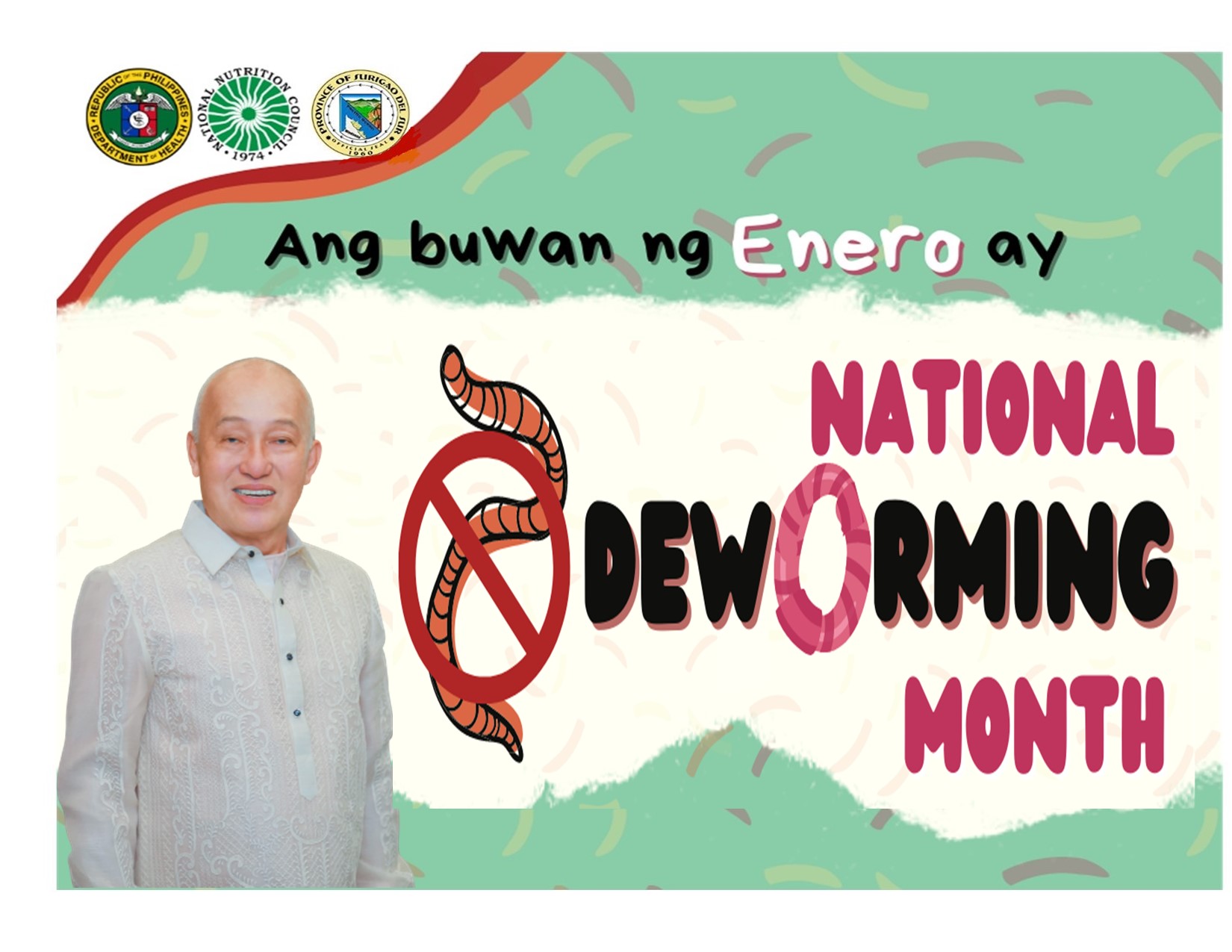JANUARY - NATIONAL DEWORMING MONTH
This January, we are observing the National Deworming Month. It aims to combat and reduce Soil Transmitted Helminth Infections (STH) through mass drug administration of anthelmintic medicines to at-risk populations such as children, pregnant women, food handlers, farmers and indigenous populations. This project is conducted twice a year, every January and July and is headed by the Department of Health in partnership with the LGUs, DepEd, schools and communities. Due to the COVID-19 pandemic, the school-based mass drug administration campaign for STH across the Philippines has been halted and an increase in STH infections is expected. Thus, other strategies for STH prevention such as proper water, sanitation and hygiene (WASH) should be practiced to prevent further transmission of STH.
Who is at risk of having Soil Transmitted Helminth Infections?
Soil Transmitted Helminth Infections (STH) are parasitic infections from contaminated soil, food or water. It usually affects underprivileged communities with poor access to adequate water, sanitation and hygiene (WASH). Preschool aged children ages 2-4 years and school-aged children ages 5-12 years old are the most vulnerable to infection.
How does STH affect a child’s growth and development?
Worms are intestinal parasites that compete with nutrients and even steal nutrients from their host. It leads to malnutrition, weakness, feeling tired, impaired mental and physical development in growing children and poor performance in school and work. An individual may also be infected with multiple parasites which is associated with higher mortality rates and increased susceptibility to infections.
How does an individual or child get worms?
Worm eggs and worms can be found in contaminated soil or water which can enter the body through direct contact, unclean food or water and through the skin when walking barefoot on contaminated soil. Once inside the body, they travel into the intestines and multiply and release their eggs together with the feces. When these infected feces make their way to the water system through inadequate sanitation systems, it may infect other healthy individuals and the cycle repeats itself.
How can we get rid of worms?
Deworming tablets such as Albendazole and Mebendazole have been proven safe and effective against worms. They come in flavored chewable tablets. They stop the worms from growing and are excreted through the feces. However, children can be easily reinfected, thus the DOH recommends deworming school-age children twice a year. With the recent launch of the Neglected Tropical Diseases (NTDs) 2030 roadmap, the WHO recommends that preschool aged children, school-aged children and women of reproductive age (aged 15–49 years, including pregnant women in their second and third trimester) receive regular treatment with deworming tablets.
Aside from preventive deworming medicine, proper water, sanitation and hygiene (WASH) should be practiced to prevent further transmission of STH.
What are the expected side effects?
Adverse side effects are rare and are usually caused by the dead worms such as abdominal discomfort, headache and nausea which can be managed by rest and giving clean water. In case of allergic reactions such as rashes and itchiness, anti-allergy medications can be given.
How can we prevent children from having worms again?
As part of the DOH WASH or the Water, Sanitation and Hygiene for All Campaign, here are some steps on how to prevent having soil transmitted helminth infections:
1. Deworm twice a year. Deworming medications only kill the adult worms. Deworming twice a year helps kill the remaining worm eggs and prevents the spread and reinfection of other individuals.
2. Do not defecate in the open. Defecation in the open spreads worm eggs into the soil, water or environment which may come in direct contact with the skin, water system or food.
3. Wear slippers or shoes. This is to prevent hookworm infections which usually come from direct skin contact with contaminated soil.
4. Wash hands with soap and clean water. Since worm eggs can be found in contaminated feces, soil or water, it is important to wash your hands before eating to prevent infection.
5. Wash vegetables and cook them thoroughly before eating. Worm eggs can survive in the soil for months and can contaminate vegetables and fruits. Cleaning raw fruits and vegetables with clean water and thorough cooking (boiling point) will help kill the worm eggs and prevent infection.
References:
[1] Department of Health (n.d.) DOH Conducts National Deworming Month to Reinforce Prevention and Control of Soil-Transmitted Helminths. GOVPH. Retrieved from https://doh.gov.ph/node/10545
[2] World Health Organization (n.d.). Deworming in children. World Health Organization. Retrieved from https://www.who.int/elena/titles/deworming/en/
[3] Department of Education (2018). WASH in Schools: Three Star Approach. Deworming: How to Reach the Stars. Metro Manila: Department of Education. Retrieved from www.deped.gov.ph
[4] Mationg, M. L. S., Tallo, V. L., Williams, G. M., Gordon, C. A., Clements, A. C., McManus, D. P., & Gray, D. J. (2021). The control of soil-transmitted helminthiases in the Philippines: the story continues. Infectious Diseases of Poverty, 10(1), 1-26.
[5] https://nnc.gov.ph/40-10-kumainments/6933-january-is-national-deworming-month

